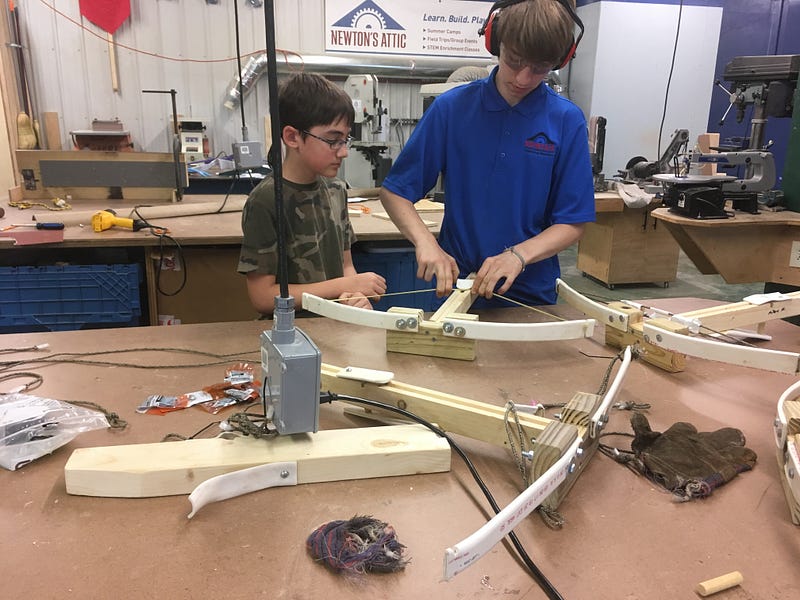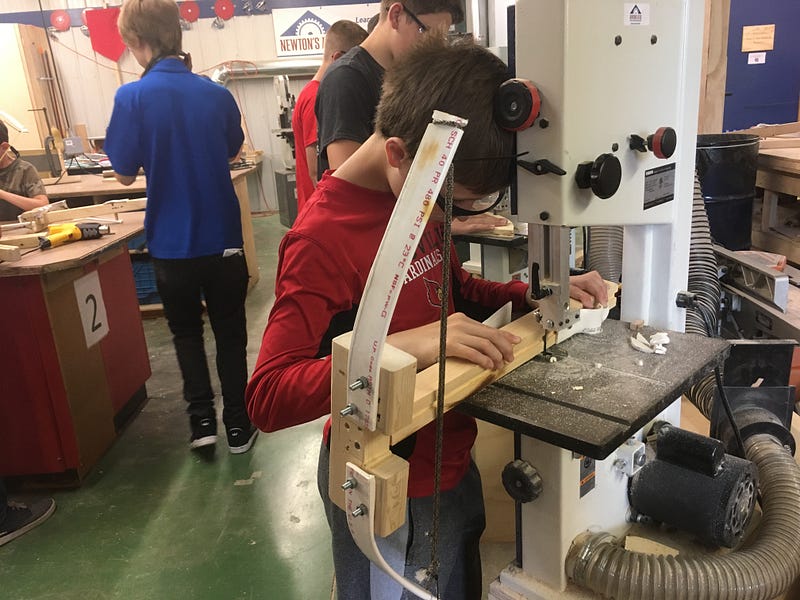
A sandy-haired boy, about twelve years of age, sits in front of the beginnings of a pinball machine, complete with flippers and obstacles and lights. In his hand, he holds a circuit-board, which will eventually turn the hollow box into an interactive game.
Gesturing towards the board, Dawn Cloyd — Community Outreach Director of Newton’s Attic and my tour guide for the afternoon — asks the boy, “Is that an Arduino?”
After he confirms that it is indeed an Arduino with the tightness of one who has just been asked a silly question, she turns to me and asks, “Do you know what that is?”
I sure do not. To me, “Arduino” sounds like a jumble of meaningless sounds.
She explains that an Arduino is like a mini computer that allows engineers to build interactive games. And then it hits me that this kid, who probably hasn’t yet graduated middle school, is building a complex, interactive machine out of absolutely nothing. And he isn’t doing it because he has to. He’s doing it because he wants to, just like the hundreds of other kids who participate in one (or more) of the nearly fifty summer programs Newton’s Attic offers each year.
These programs are held on Newton’s Attic’s large campus off of Versailles Road in Lexington. As I drove up the driveway, I almost turned around, sure that my GPS had been incorrect. From the outside, the cluster of warehouse-like buildings doesn’t look like much. But once inside, I was awestruck by the endless rooms filled with computers, chemicals, power tools, a 3-D printer, catapults, burgeoning projects, wood, saws, hammers, circuit boards, and items I am not savvy enough to name.
Remarkably, students, guided by their high school and college-age peers, are entrusted with these intimidating tools. Cloyd told me that this sort of hands-on engagement makes learning fun, helping reach kids who are not academically inclined and who aren’t aware that there is more to engineering than just abstract equations and math. Some come in unsure of what their interests are or hesitant to pursue education after high school but end up studying engineering in college, attending trade school, or developing the skills necessary to enter the workforce right after high school.
For these kids in particular, Cloyd explained, working on and successfully completing hands-on projects is key because it serves as a huge confidence boost. Many have failed time and time again in a traditional classroom environment and have come to believe that they are incapable of success. Through Newton’s Attic, they can learn that success doesn’t have to look like a 4.0, and that hard work at the right things pays off.
This was certainly true for Blaze Davis, a rising 10th grader at the School for Creative and Performing Arts in downtown Cincinnati. Davis started coming to Newton’s Attic when he was in fourth grade. He made a catapult, a drone, a Rube Goldberg machine, and spent several summers working on an independent project. This summer, he is back once again, but as a volunteer.
When I asked him to describe his duties as a volunteer, he replied quickly, “Anything they need help with.”
This means taking out the trash, working on big projects, and helping design new classes.

Current classes cover a wide range of topics, from kitchen chemistry to building a PC from scratch to engineering a catapult to video editing. Some — like “Goldberg Girls” and “Goldie Lox and the Three Gadgets” — are for girls only, but most are co-ed. All appeal to kids’ playfulness and creativity; “Nerf Gun Mods,” in which participants are given a nerf gun they can outfit with lasers, automatic motors, and more, is so popular, it is impossible for them to satisfy demand. And, more importantly, all are affordable.
According to Davis, most engineering camps like Newton’s Attic “cost far too much, but this one, you just show up and say, alright, I’m ready to work.”
The affordable price was what initially drew Davis to Newton’s Attic, but the sense that anything is possible is what made him stay.
“If want to build a GoCart, make it go 40 miles an hour, as long as it’s safe, there’s no limit… That really expanded what I thought I could do. Like, I built a jet engine from scratch and put it on a bike, and I wouldn’t have been able to do that at school, no way.”
That is education in its purest form: teaching children about the world’s endless possibilities, and giving them the tools to make those possibilities a reality.
For more information, visit newtonsattic.org

Eliza Jane Schaeffer is from Lexington and is a rising sophomore at Dartmouth College.
The opinions expressed on the Forum represent the individual students to whom they are attributed. They do not reflect the official position or opinion of the Prichard Committee for Academic Excellence or the Student Voice Team. Read about our policies.













